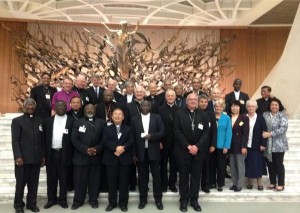As I write this entry, we are in the middle of the 2nd week of the Synod on family. I ask for your prayers.
You may recall that my prayer at the beginning of the Synod was threefold: that confidence be restored for married couples and their families as they seek to live faithful witness to the Gospel of joy; that the beauty of marriage in Holy Scripture and Church teaching shine forth; and that we as a Church seek to reach out and accompany those families who struggle in their family circumstances.
People yearn not to be at the mercy of statistics that seem to portray a self-fulfilling prophecy of doom. Hope needs to be restored!
Yesterday I was invited to be part of the Vatican press conference at the end of the morning sessions. We were asked about the progress of the small groups, which have worked hard this week to refine and clarify the initial working document that was released on Monday. The Vatican news bulletin summarized my remarks this way: “the group’s proposed changes had three basic purposes: ‘to highlight the importance of the witness of sacrificial, loving families today;’ to encourage a missionary spirit of ‘reaching out and accompanying people, starting where people are,’ and ‘to locate clearly our pastoral avenues and pastoral outreach … within the beauty of sacred Scripture and our church teaching.'”
There are ten small groups divided according to language, and we are one of three using English. Our group concentrated on providing refinement and clarity to the working document and providing amendments to strengthen that document. We will review the final document later this week, and delegates will have the opportunity to vote on the text.
As we approach the final days of the Synod, I have a deep hope. It is that the document will advance two great goods. First, may it proclaim the time-honored teaching of the Church in a way that captures its inexhaustible beauty. Second, may this abundant beauty unleash the power of the authentic teaching to inspire the restored confidence that happy, healthy, and holy marriages and families are attainable today, as the Church heeds the call of Jesus to accompany families on this path.
Two concepts have received attention and need to be highlighted and clarified. The first is what is called a “missionary outlook.” Here we are called to go out and meet people where they are and seek to accompany them to Christ. The good missionary, aware of the great beauty of an encounter with Christ and with Church teaching, is wise in seeking to determine where that person is right now and to begin any conversation at that point.
The second concept is the principle of gradualness, which might be very helpful to the evangelizer in the process of accompanying individuals. The pastoral principle of gradualness and what it means and does not mean is actually found in St. John Paul II’s apostolic exhortation, Familiaris Consortio, which was issued as the fruit of the last synod on the family over 30 years ago. This principle has been part of helpful instructions to confessors during these last 30 years.
It is important that the concept is well understood if we hope it to be properly applied. Let me explain.
In considering the role of the principle of gradualness in the divine salvific plan, the Synod delegates ask what possibilities are given to married couples who experience the failure of their marriage; how it is possible to offer them Christ’s help through the ministry of the Church? The theological notion of the law of gradualness and its authentic implementation in the Catholic tradition must be carefully understood in order to answer these questions.
The “law of gradualness” cannot be interpreted as “gradualness of the law” which implies that the law is “merely an ideal to be achieved in the future” (FC 34). Any suggestion that would cause the law of gradualness to be equated or even related to relativism or proportionalism must be avoided, since both relativism and proportionalism are foreign to magisterial teaching (Veritatis Splendor 65ff, esp. 75). Along these lines, and as noted in the Vademecum for Confessors (1997), “the pastoral ‘law of gradualness’ must not be confused with ‘gradualness of the law’ which would tend to diminish the demands it places on us” (VC 3.9). The law of gradualness, “consists of requiring a decisive break with sin together with a progressive path towards total union with the will of God and with his loving demands” (VC 3.9, emphasis in original). Therefore, the willingness to abide by Jesus’ teaching on such matters, including a decisive break from sin, should be regarded as an essential starting point for gradual growth in holiness.
These principles of a missionary outlook and the proper use of the principle of gradualness will be discussed in these last days of the Synod.
This direction is certainly consistent with the time-honored principle that how we pray is rooted in the authentic teaching of the Church, that is, in what we believe. This same integrity calls us to root all of our pastoral service directly in the authentic teaching of the Church.
Please continue to pray that the Holy Spirit guide this synodal process as we prepare for the General Synod in October of 2015.





